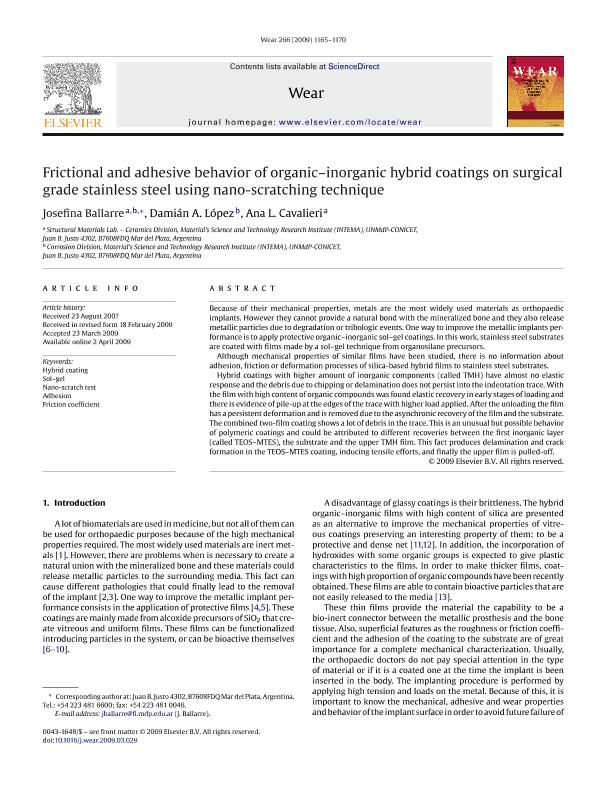Artículo
Frictional and adhesive behavior of organic-inorganic hybrid coatings on surgical grade stainless steel using nano-scratching technique
Fecha de publicación:
05/2009
Editorial:
Elsevier Science Sa
Revista:
Wear
ISSN:
0043-1648
Idioma:
Inglés
Tipo de recurso:
Artículo publicado
Clasificación temática:
Resumen
Because of their mechanical properties, metals are the most widely used materials as orthopaedic implants. However they cannot provide a natural bond with the mineralized bone and they also release metallic particles due to degradation or tribologic events. One way to improve the metallic implants performance is to apply protective organic-inorganic sol-gel coatings. In this work, stainless steel substrates are coated with films made by a sol-gel technique from organosilane precursors. Although mechanical properties of similar films have been studied, there is no information about adhesion, friction or deformation processes of silica-based hybrid films to stainless steel substrates. Hybrid coatings with higher amount of inorganic components (called TMH) have almost no elastic response and the debris due to chipping or delamination does not persist into the indentation trace. With the film with high content of organic compounds was found elastic recovery in early stages of loading and there is evidence of pile-up at the edges of the trace with higher load applied. After the unloading the film has a persistent deformation and is removed due to the asynchronic recovery of the film and the substrate. The combined two-film coating shows a lot of debris in the trace. This is an unusual but possible behavior of polymeric coatings and could be attributed to different recoveries between the first inorganic layer (called TEOS-MTES), the substrate and the upper TMH film. This fact produces delamination and crack formation in the TEOS-MTES coating, inducing tensile efforts, and finally the upper film is pulled-off. © 2009 Elsevier B.V. All rights reserved.
Palabras clave:
Adhesion
,
Friction Coefficient
,
Hybrid Coating
,
Nano-Scratch Test
,
Sol-Gel
Archivos asociados
Licencia
Identificadores
Colecciones
Articulos(INTEMA)
Articulos de INST.DE INV.EN CIENCIA Y TECNOL.MATERIALES (I)
Articulos de INST.DE INV.EN CIENCIA Y TECNOL.MATERIALES (I)
Citación
Ballarre, Josefina; López, Damián A.; Cavalieri, Ana Lia; Frictional and adhesive behavior of organic-inorganic hybrid coatings on surgical grade stainless steel using nano-scratching technique; Elsevier Science Sa; Wear; 266; 11-12; 5-2009; 1165-1170
Compartir
Altmétricas




